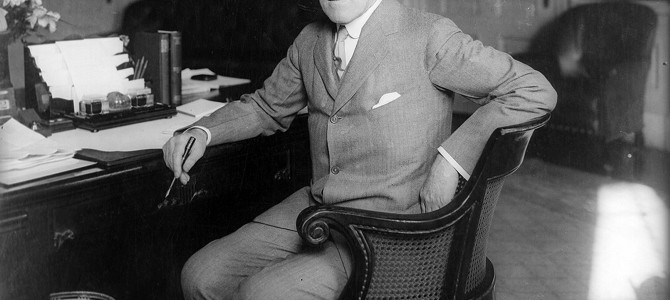
In the seventh lecture of Hillsdale College’s free online Constitution 101 course (which you can take along with me here), Ronald J. Pestritto, dean of the college’s Graduate School of Statesmanship, outlines the critiques of the Constitution from twentieth-century progressives.
Understanding the New Deal Requires Understanding Progressivism
Many scholars agree President Franklin Delano Roosevelt fundamentally altered the American government by ushering in programs and projects under his New Deal. FDR’s inspiration for these taxpayer-funded ventures came from Progressive Era thinkers. So to understand The New Deal and how American life and government changed in the twentieth century and beyond, it is vital to understand the Progressive Era, Pestritto said.
In a speech delivered in 1932, FDR cited progressive-minded presidents Theodore Roosevelt and Woodrow Wilson as his intellectual inspirations. In this speech, he said a statesman’s role must evolve over time in order to best serve his people, so a statesman’s role today ought to be different than it was during the time of America’s founding.
The Declaration of Independence discusses the problem of government in terms of a contract. Government is a relation of give and take—a contract, perforce, if we would follow the thinking out of which it grew. Under such a contract rulers were accorded power, and the people consented to that power on consideration that they be accorded certain rights. The task of statesmanship has always been the redefinition of these rights in terms of a changing and growing social order. New conditions impose new requirements upon government and those who conduct government.
Progressives believed restricting government to only protecting citizens’ life, liberty, and ability to pursue happiness was simplistic. They believed that as time went on, human beings evolved for the better, thus becoming better at self-governance. Thus people should not fear the ever-expanding role of government because modern Americans, whom progressives believed were smarter and more advanced than colonial Americans were, created and devised it.
Wilson: The Declaration Of Independence Is Irrelevant
In 1923, Wilson delivered a speech outlining progressivism. He denounced the Declaration of Independence as irrelevant to modern Americans unless it can be translated and expanded to fit the problems facing twentieth-century Americans.
The Declaration of Independence did not mention the questions of our day. It is of no consequence to us unless we can translate its general terms into examples of the present day and substitute them in some vital way for the examples it itself gives, so concrete, so intimately involved in the circumstances of the day in which it was conceived and written. It is an eminently practical document, meant for the use of practical men; not a thesis for philosophers, but a whip for 20 tyrants; not a theory of government, but a program of action. Unless we can translate it into the questions of our own day, we are not worthy of it, we are not the sons of the sires who acted in response to its challenge.
Wilson went on to say that modern European thinkers had declared that men were defined not by their individuality, but by their society. And one’s rights come from government, not from God — a rejection of natural law. Wilson encouraged Americans to adopt this European understanding of rights and man’s role in society.
Progressives thought the U.S. Founding Fathers’ assumption that natural law ought to be embraced in order to develop a free and just society was arrogant. And they questioned the timelessness of the Founding Fathers’ values.
Progressives Then and Now: Natural Law Is Silly
In an essay penned in 1935, John Dewey, arguably America’s most famous progressive thinker, declared the Founding Fathers were irrelevant. He argued the Founders’ appeal to natural law as an eternal concept that has preceded man and will carry on throughout human history is bunk, because their view of liberty was shaped by the society around them, and that society had passed.
The earlier liberals lacked historic sense and interest. For a while this lack had an immediate pragmatic value. It gave liberals a powerful weapon in their fight with reactionaries. For it enabled them to undercut the appeal to origin, precedent and past history by which the opponents of social change gave sacrosanct quality to existing inequities and abuses. But disregard of history took its revenge. It blinded the eyes of liberals to the fact that their own special interpretations of liberty, individuality and intelligence were themselves historically conditioned, and were relevant only to their own time. They put forward their ideas as immutable truths good at all times and places; they had no idea of historic relativity, either in general or in its application to themselves.
In 1887, Wilson declared that socialism and democracy are essentially the same.
For it is very clear that in fundamental theory socialism and democracy are almost if not quite one and the same. They both rest at bottom upon the absolute right of the community to determine its own destiny and that of its members. Men as communities are supreme over men as individuals. Limits of wisdom and convenience to the public control there may be: limits of principle there are, upon strict analysis, none.
Wilson’s rejection of natural law theory and the idea that people’s rights remain constant throughout time and are not changed by society marks a shift in American thinking. His predecessors, namely Theodore Roosevelt and FDR, continued this way of thinking as they fundamentally altered the role of government. Under these three administrations, the office of the presidency expanded drastically and this shift in thinking during the progressive era changed American life forever.









